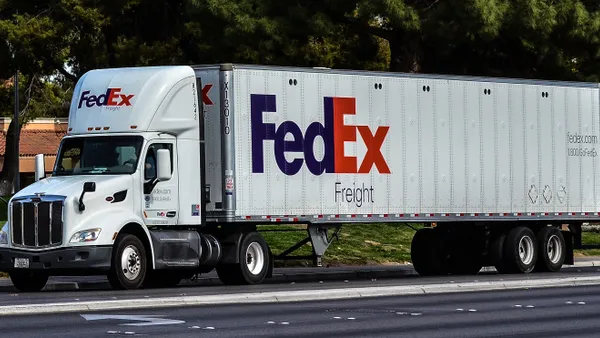Dive Brief:
- New York City Economic Development Corporation (NYCEDC) released a request for proposals (RFP) Monday seeking operators for the new marine terminal on the Hunts Point Peninsula in the South Bronx, according to a press release.
- This RFP is part of New York's Freight NYC plan, released in 2018, which aims to modernize New York's freight system to keep up with growing last mile demand while mitigating road congestion, which the NYCEDC estimates will cost the local economy $27 billion in the next 30 years. Reviving barge service on the city's waterways is part of the plan.
- "Activating a new marine terminal in Hunts Point is critical to diversifying our freight distribution system and keeping New York one of the most eco-conscious cities on the planet," said NYCEDC President and CEO James Patchett in a statement. Proposals are due June 7, 2019 by 4 p.m.
Dive Insight:
The project is primarily intended to relieve truck traffic around Hunts Point Food Distribution Center — home to massive produce, meat and fish markets that supply businesses in New York City and beyond. The Freight NYC plan stipulates marine traffic could service the surrounding areas from the Mid-Atlantic through New England as well as New York's immediate area.
Skeptics of the plan argue truck traffic could increase at points within the city where the barge traffic transfers to the road and have called on the mayor's office to perform a traffic impact study.
Supporters point to the resurgence of ferries for transport around New York's five boroughs as evidence that the city is ready for more water transport. The city also points to the Red Hook container terminal as proof of concept for the Uptown project. The Port of Redhook eliminated 30,000 truck trips a year from city streets, according to the Freight NYC plan. With the Hunts Point terminal, the city expects to eliminate 1 million truck trips annually while also reducing greenhouse gas emissions and improving air quality in the South Bronx.
"Using waterways to move freight will improve the reliability of regional freight delivery while improving air quality and increasing redundancy in the good movement network," Suzanne Richer, president of the Council of Supply Chain Management Professionals (CSCMP) NY/NJ Roundtable, said in a statement.
The city is looking to create a "hub and spoke" barge operation to handle containers and pallets. Further steps to formalize this network will include:
- Convening a regional barge council with port authorities, maritime businesses and shippers.
- Coordinating with regional entities to encourage and improve service between New Jersey container terminals, New York City and New England ports.
- Regular maintenance dredging of New York City’s borough waterways.
Few, if any, parties object to taking traffic off New York City's streets and the highways that feed them.
"The I-95 Corridor Coalition welcomes NYCEDC’s plan to develop barge service that moves forward the vision of the I-95 Marine Highway corridor — a network of interconnected facilities, encompassing the waterways paralleling and complementing the Interstate 95 highway and rail network on the Eastern Seaboard from Maine to Florida," I-95 Corridor Coalition Executive Director Patricia Hendren said in a statement.














